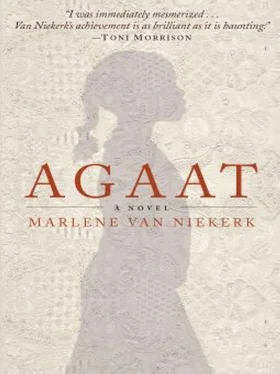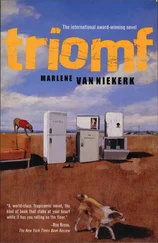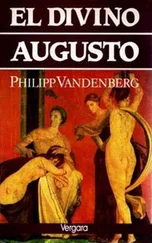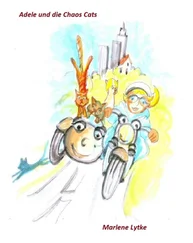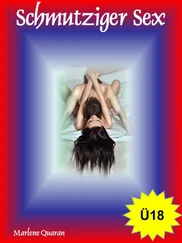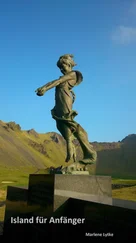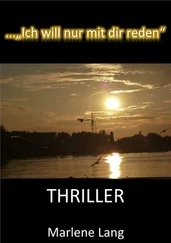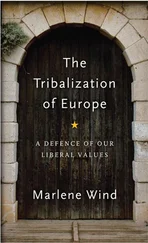The doors slam. The cars pull off. The dogs bark.
The joke of the afternoon seems small. A small forlorn joke. I can feel it seeping out of me. I feel heavy. I feel dense. I don’t feel sad. I feel tired. Agaat is sad. I know, I can feel it.
She remains standing on the stoep. She calls the dogs back. I hear them panting. I close my eyes. I can picture their tails wagging, their open-mouthed laughing with her. They come to have their heads stroked.
Look at you Boela, where have you been again?
Her voice comes with an effort. She tries to bend it into shape by talking to the dogs, appropriating the liveliness of dogs. Dogs that can come and go and wallow in the dust, in dead things, to appropriate the smell for themselves, to get up and to scrabble with the back feet.
Come here, Koffie, but my goodness, you too. Where do you find mud to roll in now? Oh sis, but you stink!
Agaat doesn’t come in. I can see her standing there. She watches the gate being opened and closed. She remains there longer than usual. She watches the cars turning off into the main road, the billows of dust getting smaller and disappearing over the hill. She feels the weight of the evening waiting, she smells the last still black water of the drift, she sees the dark mountain rearing up and the black tree-tops of Grootmoedersdrift.
But that’s better than nothing, it’s better than me in my white bed in here.
She does not want to come in.
She does not want to enter the house. But there is nowhere else. Nothing else. Not as long as I’m here. This is the cup. This is the book. Drink it, turn its pages.
Ai, I hear, look at how dry you are.
I hear her go down the stoep steps. Water on the cement. It’s the garden hose. The water splat-splats in a feeble stream. Agaat is watering the pot plants. She talks to them. She wants me to hear. That is how I taught her. Plants flourish when you talk to them, especially in pots. They grow shiny leaves. That’s their reply.
Virgin’s tears, she says, hen-and-chickens, hoya, Mackaya bella, delicious monster, peace in the home.
Tonight she gets no further than a roll-call.
The hose drags around to the other side of the stoep. One thing leads to another. Now it’s the bed right under the stoep that the irrigation doesn’t always reach.
Agaat is buying time. She considers what next. She makes plans. How to proceed. How to keep things well-aired and well-lit. Coping with the evening, coping with the morning.
One pot, another pot is dragged across the stoep. Wet terracotta gritty on the cement. The early December move. Then the late-afternoon sun shines in under the veranda and dries everything out.
There, now you’re out of the heat, says Agaat.
She grunts as she comes upright.
Everything is wet. The tap has been closed. The pots have been moved. Now she must in. Now she can’t do anything else. But it’s grown dark. She has somewhere to start. The curtains to draw, the table lamps to switch on. A sign of life she can give. This is a farm. People are living here. Sweetenough’s the name of the wife, Goodenough’s the name of the maid.
I hear her at the front door. She wipes her feet on the cane mat. Once, twice, checks under the soles, once more. A sigh. Then she’s in. She closes the door, locks, latches from the inside. She looks at the latch. She turns round. She looks at the sitting room. She takes one step in, another, she’s on the carpet. Now she’s ready. Now the hand does what it finds to do, the left hand in front, the right hand behind.
I hear a curtain, another, I hear a note, a phrase. Then she finds the tune. Then I find it. It’s for me, Agaat, I know, sing for me there in the sitting room. Blow the wind southerly , she hums. She knows it from the old record of Kathleen Ferrier. Did we throw it away with the clearing-out? Her voice is weak. She clears her throat, starts again.
Sing, Agaat. You sing the old-old tunes. Sing the songs of yesteryear. The music of the front room. Sing of the wind round the corners of the house, the south-easter, the north-wester. The song of the window frames, of the door frames and the curtains, of the standard lamps and the carpet with the red flowers and the sideboard of dark imbuia that has surrendered its secrets. And the riempie chairs and the riempie bench and the round table in the corner. The mute words of people, the still dense things, the old ornaments from which at the beginning you couldn’t keep your eyes. Are you touching, now, Diana and her tame wolves in old brown porcelain? Do you pick up the little copper Indian shoe, the shoe in which you always in spring put the kukumakranka for me? And the swans of white blown glass, do you touch their necks and do you see the green vase for freesias, the blue one full of daffodils, the big grey vase that you stuck together, the one for the wild flowers of September, for the first blue lupins, for the blue-purple hydrangeas?
Sing softly of the evening’s coming and of the evening meal, the sausage and eggs and the red tomatoes and the fresh loaf with the crackled brown crust, the milk in the jug that was a wedding gift, the square of butter under glass. The white tablecloth, the oven glove around the ears of the black iron saucepan, the sitting-down, the hands under low light, around the knives, around the forks, the spoons with the ivory handles, the people who look at each other, or do not look, speak to each other, or do not speak, or speak without words. Sing, that you may be consoled. Because that you now have to do for yourself, as you’ve always had to do.
Oh sing, sing, Agaat, of the wind that blows from the south and the ship in the offing, because it is in the offing. I see it in the distance. White is its bow and its splines are white and it’s coming over the hump-backed hills, closer I see it coming, ever closer.
I understand. You don’t think my joke this afternoon was funny. It’s a sad song, that’s all.
I open my eyes. The lights are suddenly on in the room.
Look, says Agaat, with all the hubbub you haven’t even seen yet.
She points next to my bed.
The rainbow is gone. Now there is a mountain with a vlei in front of it. It is full of white water-hawthorn. The mountains reflect a darkness amongst the flowers. An early-morning scene, a painting from the sitting room. I thought we had thrown it away.
The blue blue hills of home, says Agaat, I went and fetched it from the cellar.
And look here, the portrait of the grandmother. I thought you might want to see it once more.
It’s the portrait in front of which my mother used to make me stand when I was small. Her hand heavy on my shoulder. Look, Milla, it’s she who farmed into being this little plot of earth. One day it will be yours.
A matriarch in the making, her mouth young, her plump white fingers folded round a rolled-up document, her hair pulled back tightly in a bun, her cheeks two touched-up red stains, the collar around her neck of fine white lace, the one eye small and fierce, the other one larger, clear-sighted, the eye over which something reflects distractingly on the gibbous glass of the oval frame, a rectangle of white, my bed, a smudge of grey, my head, my grey hair on the pillow.

Clear out clear out my iniquitous life! screams the bob-head-doll she strikes her stick on the floor give away! bequeath! burn! the wise hoard no button the prudent begin discarding at fifty a lifetime’s gleaned-together rags tassels and tatters those condemned to death would have to clear out all save the rope of the gallows enviable the chaste suicide’s furious meticulousness museums are in cahoots with the negligence of the dying a comb a necklace a shoe-horn writers hook after the last hung-up coat a hat behind the door rummage in bottom drawers they the custodians should rather have to sing inflammatory songs in the archives should with the last cadences have to dig holes in the cellars raise demolition-axes light purifying fires come beloveds let us expedite the onslaught of moth and rust! and let us inspire the breath of the blowing dust! start with the linen cupboard! start with the veil-netting of the third dress of a woman start with the redundant winding-cloths the cosy coverings with which one tries to charm death give away! bequeath! burn! I make the list and you make three piles for giving away burning and bequeathing and today you will be in paradise with me even before the cocks have crowed.
Читать дальше
